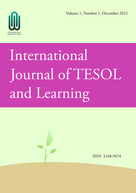


Volume 11 Issues 1-4 (2022-12-31)
Volume 10 Issues 3&4 (2021-12-31)
Volume 10 Issues 1&2 (2021-06-30)
Volume 9 Issues 3&4 (2020-12-31)
Volume 9 Issues 1&2 (2020-06-30)
Volume 7 Issues 3&4 (2018-12-31)
Volume 6 Issues 3&4 (2017-12-31)
Volume 6 Issues 1&2 (2017-06-30)
Volume 5 Issues 1&2 (2016-06-30)
University-based academicians, school-based mentors, and pre-service teachers need to work in harmony to effectively train future teachers. Although there are studies on both the supportive and problematic nature of mentoring, few have examined the effect of external factors such as curriculum reforms on mentee development and the mentee-mentor relationship. Therefore, this ethnographic study examined the experiences of pre-service English teachers and their mentors during a curriculum reform. The data were drawn from the researcher’s field notes, the pre-service teachers’ weekly written reflections, their answers to open-ended questions administered at the end of the study, and informal interviews with the mentors. The analysis of the data revealed the challenges that mentees and mentors face with a new curriculum. Mentors resisted the curriculum reform and were unable to provide the guidance and support mentees needed, and the mentees struggled to cope with contextual inadequacies and their mentors’ traditional teaching practices.
The purpose of this mixed-methods study was to examine Chinese college English teachers’ perceptions of classroom assessment and its implementation in the classrooms. Data were collected from a teacher survey administered to 41 college English teachers at a Chinese university, five teacher interviews, and three classroom observations. Although teachers’ gender, highest level of education, age, and teaching experience did not have significant effects on their perceptions of classroom assessment, their EFL assessment educational background did have a significant effect on their perceptions and practices. The qualitative results confirmed the quantitative findings and also suggested that they encountered various challenges during the implementation of classroom assessment. Implications for Chinese college English teachers and pre-service teachers are discussed.